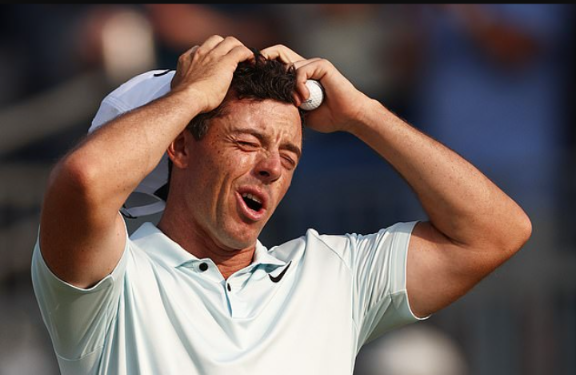Rory McIlroy’s quest for his fifth major title hit a heartbreaking roadblock at the U.S. Open. In a dramatic and intense final round, the 35-year-old missed two crucial par putts inside of four feet, narrowly losing out on a victory that was within his grasp. For McIlroy, the sting of this defeat is not just a matter of missed opportunity but a significant mental hurdle that he must now navigate.
The Weight of Expectations
For McIlroy, the pressure of winning another major has been mounting since his last triumph in 2014. As one of the sport’s most talented and high-profile players, every tournament brings with it the weight of enormous expectations from fans, the media, and himself. This latest disappointment at the U.S. Open, therefore, isn’t just a lost match but a blow to his confidence and self-belief.
The Mental Battle
The psychological toll of narrowly missing out on a major win can be profound. McIlroy, like many elite athletes, must contend with the mental anguish of what-ifs and the nagging doubts that can creep into one’s mind after such a close call. The immediate aftermath of the U.S. Open will likely be a period of introspection and emotional turbulence for McIlroy as he grapples with the missed putts that defined his tournament.
Strategies for Recovery
To overcome this setback, McIlroy can employ several strategies:
1. **Reflection and Acceptance**:
McIlroy needs to allow himself time to reflect on the tournament and accept the outcome without harsh self-criticism. Understanding that missed opportunities are part of the game can help him move past the immediate disappointment.
2. **Mental Coaching**:
Engaging with a sports psychologist can provide McIlroy with tools to manage his emotions and refocus his mental energy. Techniques such as visualization, mindfulness, and cognitive restructuring can be instrumental in helping him regain his mental edge.
3. **Physical and Mental Rest**:
Taking a short break from the sport might help McIlroy recharge both physically and mentally. This rest period can be crucial for reducing stress and returning to competition with a fresh perspective.
4. **Revisiting Fundamentals**:
Spending time honing his basic skills and mechanics could boost his confidence. Returning to the fundamentals of his game can remind McIlroy of his strengths and reignite his passion for golf.
5. **Setting New Goals**:
Setting achievable short-term goals can provide a sense of direction and purpose. Focusing on small victories, such as improving his short game or maintaining consistency, can build positive momentum.
6. **Support System**:
Leaning on his support network of family, friends, and coaches will be essential. Their encouragement and advice can provide the emotional support he needs to bounce back.
#### Looking Forward
Rory McIlroy’s resilience has been tested many times throughout his career, and each setback has shaped him into a stronger competitor. The disappointment at the U.S. Open is yet another chapter in his journey. If he can navigate this mental battle with grace and determination, he will not only be poised to win future tournaments but will also solidify his legacy as one of golf’s most resilient and tenacious players.
The road ahead may be challenging, but McIlroy’s ability to learn and grow from his experiences will be the key to overcoming this latest setback. With the right mindset and support, his next major victory might be just around the corner, proving once again that setbacks are merely setups for greater comebacks in the world of sports.
